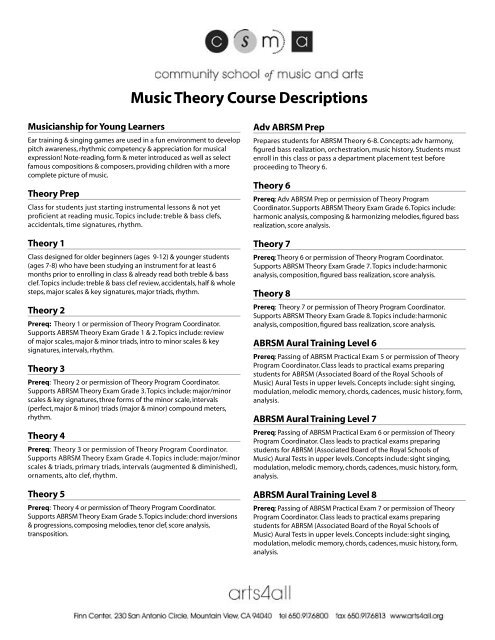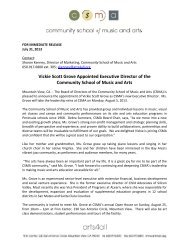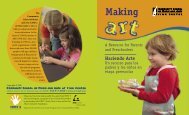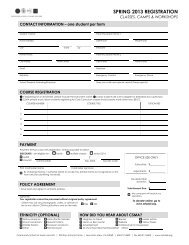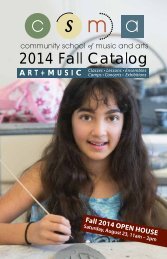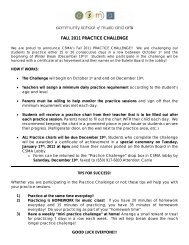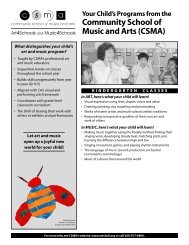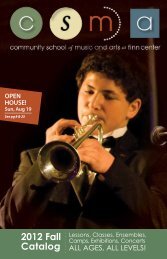Music Theory Information - Community School of Music and Arts
Music Theory Information - Community School of Music and Arts
Music Theory Information - Community School of Music and Arts
You also want an ePaper? Increase the reach of your titles
YUMPU automatically turns print PDFs into web optimized ePapers that Google loves.
<strong>Music</strong> <strong>Theory</strong> Course Descriptions<strong>Music</strong>ianship for Young LearnersEar training & singing games are used in a fun environment to developpitch awareness, rhythmic competency & appreciation for musicalexpression! Note-reading, form & meter introduced as well as selectfamous compositions & composers, providing children with a morecomplete picture <strong>of</strong> music.<strong>Theory</strong> PrepClass for students just starting instrumental lessons & not yetpr<strong>of</strong>icient at reading music. Topics include: treble & bass clefs,accidentals, time signatures, rhythm.<strong>Theory</strong> 1Class designed for older beginners (ages 9-12) & younger students(ages 7-8) who have been studying an instrument for at least 6months prior to enrolling in class & already read both treble & bassclef. Topics include: treble & bass clef review, accidentals, half & wholesteps, major scales & key signatures, major triads, rhythm.<strong>Theory</strong> 2Prereq: <strong>Theory</strong> 1 or permission <strong>of</strong> <strong>Theory</strong> Program Coordinator.Supports ABRSM <strong>Theory</strong> Exam Grade 1 & 2. Topics include: review<strong>of</strong> major scales, major & minor triads, intro to minor scales & keysignatures, intervals, rhythm.<strong>Theory</strong> 3Prereq: <strong>Theory</strong> 2 or permission <strong>of</strong> <strong>Theory</strong> Program Coordinator.Supports ABRSM <strong>Theory</strong> Exam Grade 3. Topics include: major/minorscales & key signatures, three forms <strong>of</strong> the minor scale, intervals(perfect, major & minor) triads (major & minor) compound meters,rhythm.<strong>Theory</strong> 4Prereq: <strong>Theory</strong> 3 or permission <strong>of</strong> <strong>Theory</strong> Program Coordinator.Supports ABRSM <strong>Theory</strong> Exam Grade 4. Topics include: major/minorscales & triads, primary triads, intervals (augmented & diminished),ornaments, alto clef, rhythm.<strong>Theory</strong> 5Prereq: <strong>Theory</strong> 4 or permission <strong>of</strong> <strong>Theory</strong> Program Coordinator.Supports ABRSM <strong>Theory</strong> Exam Grade 5. Topics include: chord inversions& progressions, composing melodies, tenor clef, score analysis,transposition.Adv ABRSM PrepPrepares students for ABRSM <strong>Theory</strong> 6-8. Concepts: adv harmony,figured bass realization, orchestration, music history. Students mustenroll in this class or pass a department placement test beforeproceeding to <strong>Theory</strong> 6.<strong>Theory</strong> 6Prereq: Adv ABRSM Prep or permission <strong>of</strong> <strong>Theory</strong> ProgramCoordinator. Supports ABRSM <strong>Theory</strong> Exam Grade 6. Topics include:harmonic analysis, composing & harmonizing melodies, figured bassrealization, score analysis.<strong>Theory</strong> 7Prereq: <strong>Theory</strong> 6 or permission <strong>of</strong> <strong>Theory</strong> Program Coordinator.Supports ABRSM <strong>Theory</strong> Exam Grade 7. Topics include: harmonicanalysis, composition, figured bass realization, score analysis.<strong>Theory</strong> 8Prereq: <strong>Theory</strong> 7 or permission <strong>of</strong> <strong>Theory</strong> Program Coordinator.Supports ABRSM <strong>Theory</strong> Exam Grade 8. Topics include: harmonicanalysis, composition, figured bass realization, score analysis.ABRSM Aural Training Level 6Prereq: Passing <strong>of</strong> ABRSM Practical Exam 5 or permission <strong>of</strong> <strong>Theory</strong>Program Coordinator. Class leads to practical exams preparingstudents for ABRSM (Associated Board <strong>of</strong> the Royal <strong>School</strong>s <strong>of</strong><strong>Music</strong>) Aural Tests in upper levels. Concepts include: sight singing,modulation, melodic memory, chords, cadences, music history, form,analysis.ABRSM Aural Training Level 7Prereq: Passing <strong>of</strong> ABRSM Practical Exam 6 or permission <strong>of</strong> <strong>Theory</strong>Program Coordinator. Class leads to practical exams preparingstudents for ABRSM (Associated Board <strong>of</strong> the Royal <strong>School</strong>s <strong>of</strong><strong>Music</strong>) Aural Tests in upper levels. Concepts include: sight singing,modulation, melodic memory, chords, cadences, music history, form,analysis.ABRSM Aural Training Level 8Prereq: Passing <strong>of</strong> ABRSM Practical Exam 7 or permission <strong>of</strong> <strong>Theory</strong>Program Coordinator. Class leads to practical exams preparingstudents for ABRSM (Associated Board <strong>of</strong> the Royal <strong>School</strong>s <strong>of</strong><strong>Music</strong>) Aural Tests in upper levels. Concepts include: sight singing,modulation, melodic memory, chords, cadences, music history, form,analysis.
Teens & Adults<strong>Music</strong> <strong>Theory</strong> – BegJust beginning to study an instrument? Playing or singing for yearsbut aren’t comfortable with musical notation? Want to learn moreabout how music is organized? This class is for you! No previoustheory training required. Topics include: treble & bass clefs, accidentals,half & whole steps, the major scale, writing & identifying major keysignatures, major & minor triads, rhythm & meter, ear training, sightsinging.<strong>Music</strong> <strong>Theory</strong> – IntermPrereq: Beg <strong>Theory</strong> or familiarity with topics covered in that class.Topics include: review <strong>of</strong> major scales & key signatures, intervals,augmented & diminished triads, primary & secondary triads, minorscales & key signatures, dominant 7th chords, chord inversions, eartraining, sight singing.<strong>Music</strong> <strong>Theory</strong> – AdvPrereq: Interm <strong>Theory</strong> or familiarity with topics covered in that class.Topics include: 7th chords & inversions, chord progressions, cadences,melody harmonization, secondary dominants, modulation, phrasestructure, form, more.Play & Apply Jazz <strong>Theory</strong>Improve your underst<strong>and</strong>ing <strong>of</strong> the structure <strong>of</strong> jazz music! Learntheory as it relates to improv & composition. Topics include: chordconstruction, scales, modes. Analysis <strong>of</strong> melodies & transcribed solos.Continuing analysis <strong>of</strong> more adv tunes, chord sequences & relatedscales.


